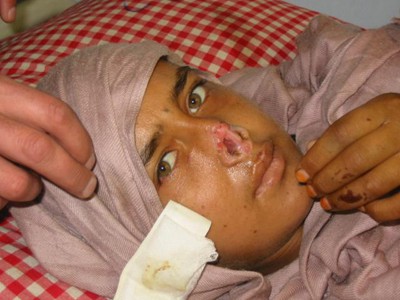The News and Observer, May 1, 2008
Abused Afghan women often wind up in jail
Women who flee domestic violence are imprisoned as adulterers.
Alisa Tang
Trafficked across the border from Pakistan with her 3-year-old son, Rukhma was handed to an Afghan who raped and abused her, then beat the toddler to death as she watched helplessly.
He was jailed for 20 years for murder, but Rukhma ended up in prison, too.
Rukhma, who doesn't know her age but looks younger than 20, had put up with her mistreatment for three months last summer before seeking protection and justice from authorities. Instead she was given a four-year sentence Dec. 5 for adultery and "escaping her house" in Pakistan, even though she says she was kidnapped and raped.

Nazia, 16, was wedded to a 40-year-old man who brutally cut off her ears and nose, shaved her head and burnt her feet with boiling water.
The fall of the Taliban six years ago heralded new rights for Afghan women: to go to school or get a job and be protected under the law. Women's rights are now enshrined in the constitution.
Yet except for a small urban elite, a woman fleeing domestic violence or accusing a man of rape often ends up the guilty party in the eyes of judges and prosecutors.
"Why am I here? I'm innocent," Rukhma said, crying in a musty jail cell and cradling a baby daughter by her previous marriage whom she bore in prison. "It is cruel to have your son killed before your eyes and then to be imprisoned."
In parts of Afghanistan and neighboring Pakistan, where stern social codes prevail, a woman who runs away from home is typically suspected of having taken a lover and can be prosecuted for adultery. Simply leaving her house without her family's permission may be deemed an offense -- as in Rukhma's case -- although it is not classified as such under Afghanistan's penal code.
The chief prosecutor of eastern Nangarhar province who oversaw Rukhma's case suggested she got off lightly.
"If my wife goes to the bazaar without my permission, I will kill her. This is our culture," Abdul Qayum shouted scornfully during an interview in his office in the city of Jalalabad.
His colleagues laughed approvingly. "This is Afghanistan, not America," Qayum said.
More reports, more protection
The Afghan Independent Human Rights Commission registered 2,374 cases of women complaining of violence in 2007, compared with 1,651 in 2006 -- a sign that more are seeking help.
Family response units have been established in the police force, and there are tentative signs of sympathy in officialdom -- at least in the relatively liberal capital, Kabul.
At a Kabul hospital, a 16-year-old girl who is too scared to give her name is recuperating from reconstructive surgery after her husband cut off her nose and ears, bashed out all but six of her teeth with a stone and poured boiling water on her.
In-laws from southern Zabul province want to take the girl home, but the hospital director refuses to hand her over.
"This brother-in-law comes every day. He says, 'Let me take her home. She's OK now,' " Dr. Ghairat Mal said. "I don't trust him. The Ministry of Women's Affairs brought her to us, and I won't let her go unless they take her."
Kamala Janakiram, a U.N. human rights officer in eastern Afghanistan, said that in 70 percent to 80 percent of the cases she has seen, a woman complaining of domestic violence is charged as a criminal for running away from home.
The U.N. Office on Drugs and Crime said many rape victims are forced to marry their attackers or are jailed for adultery because proving rape is virtually impossible.
Women can end up in prison simply on the basis of gossip, said Manizha Naderi, the director of Women for Afghan Women, an aid organization. "It's a horrible, horrible practice."
Characters Count: 4427
